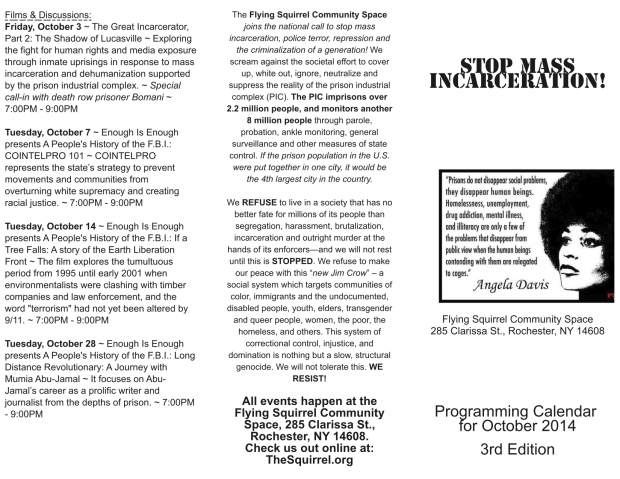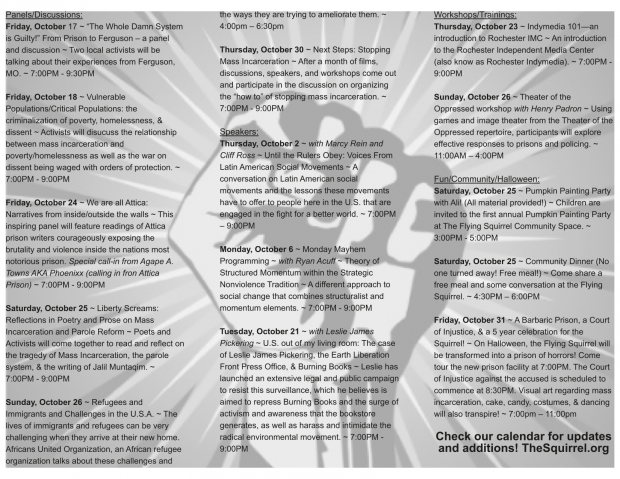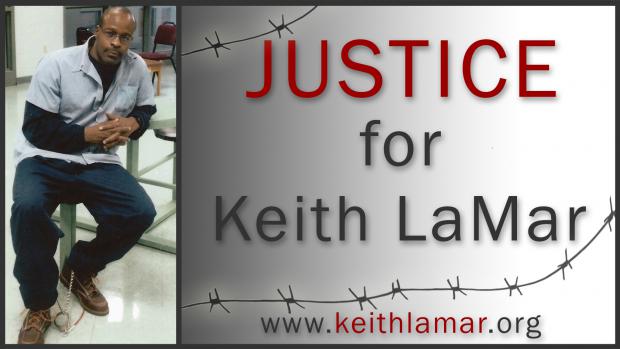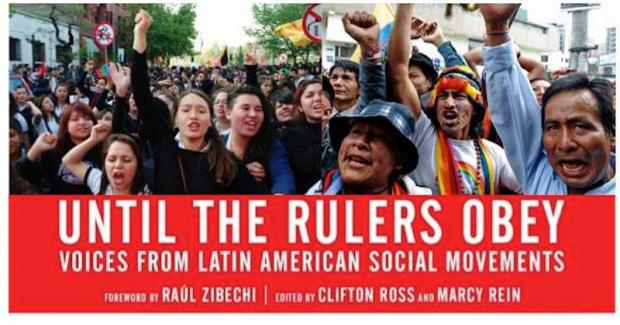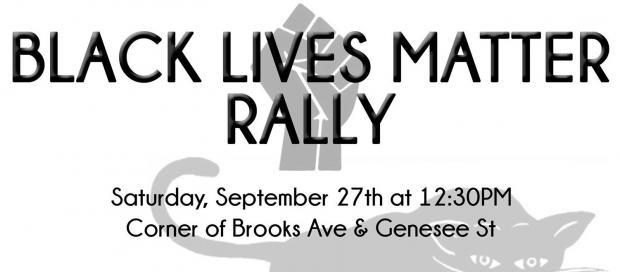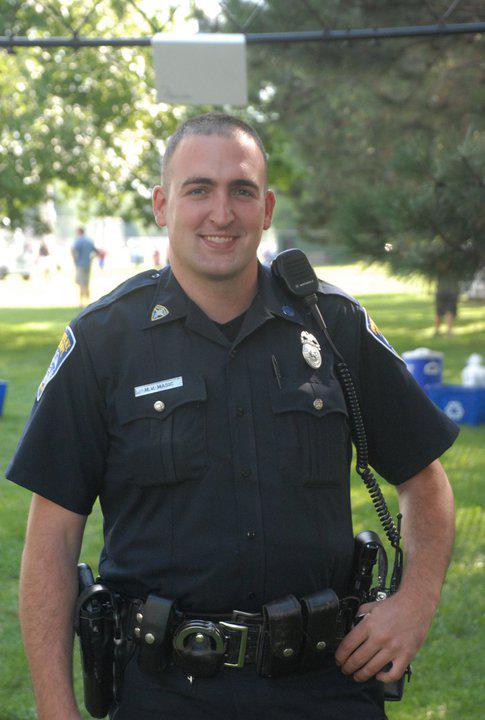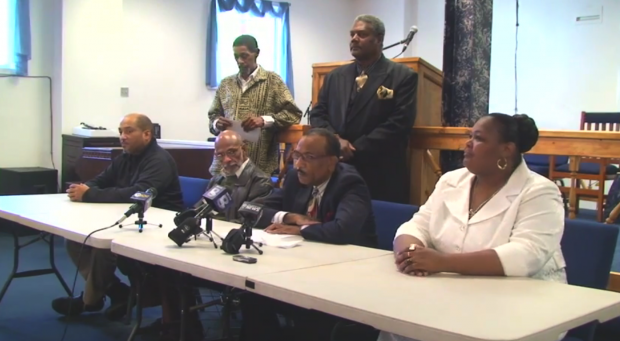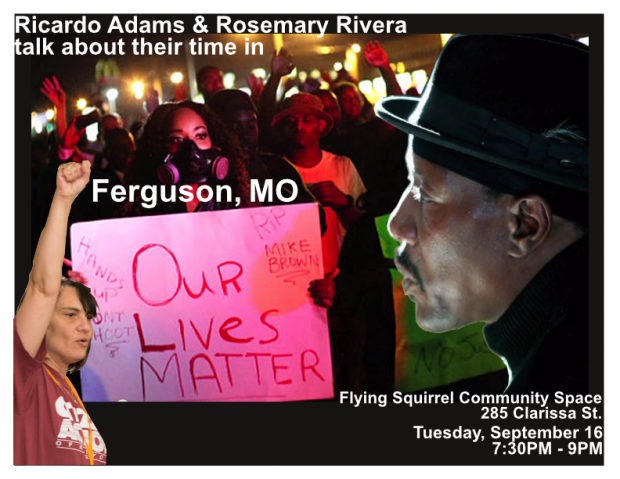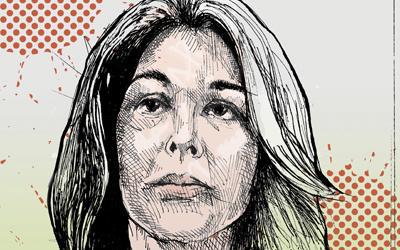Keith LaMar AKA Bomani Shakur: Live from death row
On October 3, 2014, the Flying Squirrel Community Space was able to get death row prisoner Keith LaMar on the phone live after watching "The Great Incarcerator, part 2: The Shadow of Lucasville."
Keith LaMar talking to people at the Flying Squirrel from death row
The documentary screening and the call-in event were part of a month of stop mass incarceration programming at the Flying Squirrel Community Space.
Keith LaMar AKA Bomani Shakur has been imprisoned on Ohio’s death row since 1995 for his alleged role during the “Lucasville Uprising” of 1993. He was falsely accused of having murdered prisoners and having “led a death squad.”
No physical evidence connects Keith to the murders that took place
when the prison at Lucasville was in uprising. The verdict is based on
(forced) snitch testimony.
Keith wrote a book called Condemned, in 2004, to highlight
his life and the truth about what happened. This book
Condemned: The Whole Story is now published and for sale.
FInd out more about his case and get involved in supporting him: www.KeithLaMar.org
Find out about other prisoners charged with the Lucasville Prison uprising at: justiceforlucasvilleprisoners.wordpress.com
Watch:
"The Great Incarcerator, part 1: Dark Little Secret"
"The Great Incarcerator, part 2: The Shadow of Lucasville."
Additional and Related information: FLYING SQUIRREL JOINS NATIONAL CALL-OUT TO STOP MASS INCARCERATION | Black Lives Matter Rally; Sept 27 2014 | Officer Masic to Mr. Keene: "If you don't stop moving, I'm going to shoot you." | Pass OUR community safety act now, before another Ferguson happens | Ferguson Report Back- Ricardo Adams and Rosemary Rivera | Rosemary Rivera's Messages from Ferguson | NYCLU Annual Meeting: Candis Tollver on NYPD Reform | Ricardo Adams from Ferguson, MO: "Enough is enough!" | National Moment of Silence Against Police Brutality | Reverend Stewart on What's Hot with Howard Eagle | Ban the Box Passes in Rochester! | RPD Civilian Review Board Should Have Investigative Power and Authority | Rev. Stewart gives a teach-in on Independent Civilian Review Boards
Until the Rulers Obey- Video from Oct 2, 2014
Clifton Ross and Marcy Reins spoke on Thursday evening about their new book “Until the Rulers Obey: Voices from Latin American Social Movements.” The event was organized by Rochester Red and Black and was held at the Flying Squirrel Community Space.
Black Lives Matter Rally; Sept 27 2014
Blaqsha Shakur Mandela, the videographer who captured and posted the police attack on Clem Long on Thursday Sept 18th, called for a March and Rally on Rochester's West Side.
The Rally took place on Sept 27th and included a march from Brooks ave and Genesee to the Athletic field at Wilson Academy on McCree and Genesee. Speakers at the Rally include, Blaqsha- a member of the Black Panther Party, members of Clem Longs family, members of BLACK (Building Leadership and Community Knowledge), members of the ISO (International Socialist Organization), International Action Center and Enough is Enough.
Officer Masic to Mr. Keene: "If you don't stop moving, I'm going to shoot you."
On September 18, 2014, Quintin Keene was doing his laundry at a laundromat on Genesee Street--blocks away from where Sgt. Aaron Colletti of the Rochester Police Department brutalized Clem Long Jr. Mr. Keene was arrested by officer Mario "Cowboy" Masic (the same guy who arrested Emily Good (1, 2, 3) and broke into Lewis Powell's car, among countless other stories of his terror on the West Side), two hours after Mr. Long was brutalized and arrested.
Masic bum rushed and pepper-sprayed Mr. Keene without warning, dropped him to the ground, and yelled at him--after he was in handcuffs--"If you don't stop moving, I'm going to shoot you." Mr. Keene was speaking with his grandmother on the phone when the altercation happened; she had an asthma attack as she heard her grandson violently arrested. Mr. Keene wants nothing more than to see officer Mario "Cowboy" Masic lose his job and never work for law enforcement again.
On September 20, Rochester Indymedia sat down with Mr. Keene and asked him to explain what happened. Here is his story.
Additional Information: Pass OUR community safety act now, before another Ferguson happens | Ferguson Report Back- Ricardo Adams and Rosemary Rivera | Rosemary Rivera's Messages from Ferguson | NYCLU Annual Meeting: Candis Tollver on NYPD Reform | Ricardo Adams from Ferguson, MO: "Enough is enough!" | National Moment of Silence Against Police Brutality | Reverend Stewart on What's Hot with Howard Eagle | Ban the Box Passes in Rochester! | RPD Civilian Review Board Should Have Investigative Power and Authority | Rev. Stewart gives a teach-in on Independent Civilian Review Boards
Officer Mario "Cowboy" Masic
Pass OUR community safety act now, before another Ferguson happens
United Christian Leadership Ministry held a press conference on September 25, 2014 at Inner Faith Gospel Tabernacle where they called for a police accountability legislative package to be passed that would include an independent civilian review board, body cameras for cops, the collection of data for stop and frisk (as well as its end), and law that would compel officers to inform civilians of their rights if they are stopped. The press conference also addressed the deteriorating environment of police / community relations. Reverend Lewis Stewart spoke on behalf of UCLM.
Related Information: Ferguson Report Back- Ricardo Adams and Rosemary Rivera | Rosemary Rivera's Messages from Ferguson | NYCLU Annual Meeting: Candis Tollver on NYPD Reform | Ricardo Adams from Ferguson, MO: "Enough is enough!" | National Moment of Silence Against Police Brutality | Reverend Stewart on What's Hot with Howard Eagle | Ban the Box Passes in Rochester! | RPD Civilian Review Board Should Have Investigative Power and Authority | Rev. Stewart gives a teach-in on Independent Civilian Review Boards
Greece Contradicts Its Own U.S. Supreme Court Case
For full disclosure, the one of the authors of this article, Susan Galloway, was one of the litigants against the Town of Greece in the SCOTUS case, Town of Greece vs Galloway and Stephens.
The Town of Greece was recently in a lawsuit that went to the Supreme Court of the United States, Town of Greece v. Galloway, over their prayer practice. The plaintiffs argued that the Town aligned itself with Christianity, in that in over ten years the town only had 3 non-christian prayer givers and only after the Town of Greece knew that a lawsuit was imminent.The Supreme Court ruled in favor of the Town of Greece upholding the the Town's prayer practice in a 5 to 4 decision. All three Justices of a minority faith were on the dissenting side.
The Town of Greece had no formal written prayer policy until August 18, 2014 when the Town Board passed a policy unanimously that lacked any transparency or public input. http://rochester.indymedia.org/node/104057 The Alliance Defending Freedom is a fundamentalist Christian advocacy organization that defended the Town of Greece in the lawsuit regarding their prayer policy. They appear to have incredible influence when deciding the prayer policy for the town of Greece in that the new policy is almost the exactly like the Alliance Defending Freedom's prayer policy model. Despite repeated claim's by the town of Greece in its court briefs and arguments that they were not aligning themselves with any specific religion, the town adopted the Alliance Defending Freedom's prayer policy model almost word for word as its own. It is hard to argue that you are not aligning yourself with a religion when the policy you adopted was written by an organization whose website states, "We must continue the fight for religious liberty, so that the life-changing message of Jesus Christ can be proclaimed and transform our culture. Each win for the Body of Christ is a loss for the opposition. Itʼs that black and white."http://alliancedefendingfreedom.org/issues/religious-liberty. ADF actively recruits lawsuits that challenge women's reproductive rights, including rights to contraception and abortion, equal marriage laws, non-discrimination laws, laws the that uphold the separation of church and state in public schools, laws that set limitations on politicking for tax exempt status for places of worship and organizations, and other issues that would break down the wall between church and state in the U.S. and abroad.
The new town prayer policy contradicts much of the argument Greece made to the Supreme Court and the press statements made by town officials. In the Town of Greece brief to the U.S. Supreme Court, http://www.americanbar.org/content/dam/aba/publications/supreme_court_preview/briefs-v2/12-696_pet.authcheckdam.pdf
The question presented by the Town was:
“Whether the appeals erred in holding that a legislative-prayer practice violates the Establishment Clause notwithstanding the absence of discrimination in the selection of the prayer-givers or forbidden exploitation of the prayer opportunity.”
The current policy adopted by the town post-decision introduces explicit discrimination that was only implicate in the practice of the town prior to the policy.
The brief is introduced as follows:
1. “This case concerns whether the Town of Greece, New York, can open its monthly board meetings with an invocation to solemnize the proceedings, offered by any Town resident from any faith tradition (or no faith tradition) who volunteers to speak.”
The current policy violates the very premise upon which the case was argued. No longer can “any Town resident” offer the invocation, but only those who are members of “religious assemblies”.
2. Quoting Marsh v. Chambers, the Town states that “…unless the government acts with “impermissible motive” in selecting the prayer-givers… courts may not “embark on a sensitive evaluation”.”
Again, the new policy undermines the Townʼs own argument by introducing “impermissible motive in the selecting of prayer-givers” that invites the “sensitive evaluation” that the Town claimed was not permitted.
The town further argues that “the opportunity is open to all residents”, and points to this fact as “dispositive” (conclusive in settling the issue). Thus a key “fact” in the Townʼs argument is simply no longer the case.
3. It was also claimed that, “The Town allowed any citizen to volunteer to deliver an invocation, and never rejected such a request.”
The Town has since rejected at least two specific requests, and has now instituted a policy that will permanently bar any citizen not associated with a “religious assembly”.
To illustrate how the fact that the invocation was “open to all residents” was central to the Townʼs argument, consider the volume and specificity of the following statements in the Townʼs brief:
“Under the Townʼs practice, atheists and non-believers were also welcome to volunteer to give an invocation.”
“In… 2007… Town officials met with respondents and explained that anyone could volunteer to deliver the opening prayer…”
“…any Town resident of any faith or no faith may offer the invocation.”
“… the prayer opportunity was open to anyone…”
“…there is no evidence that the town would not have accepted any and all volunteers who asked to give a prayer…”
“… the Town made no restrictions on who could volunteer to offer the prayer.”
“… it is undisputed that the Town would have welcomed atheists and nonbelievers to open the meeting with a statement of their choosing.”
“III. The Townʼs neutral policy permitting volunteer prayer-givers of any or no faith … is Constitutional…”
“… the Townʼs policy for selecting prayer-givers is facially neutral…” (facially neutral: does not even appear to be discriminatory)
“The Townʼs practice would also be Constitutional if this Court chose to evaluate it under its limited public forum jurisprudence, which affords protection to private individuals who express their views in a forum created by the government for a particular purpose that is equally open to all citizens.”
“… volunteers from any or no religion are permitted to deliver an opening statement…”
“…the town simply provided a neutral opportunity for its citizens to speak…”
“… the Town established an opportunity for private citizens to open the legislative session and allowed all to participate…”
Greece town officials also made statements to the press that contradict this new prayer policy.
In a Democrat and Chronicle article, http://www.democratandchronicle.com/story/news/2014/05/05/greece-town-board-prayer-court-ruling/8739551/, dated May 6, 2014," Reilich said that while nearly all houses of worship in Greece are Christian, there's no policy prohibiting anyone from volunteering to offer a pre-meeting invocation."
From a WHEC News 10 article, dated 05/05/2014, http://www.whec.com/article/stories/s3424461.shtml, Andrew Conlon, Greece Town Board, said, “Being a predominantly Christian community, it just happens to be that most of them are Christian, but again anybody in the community is welcome to it.” The article went further to say that “the town board is encouraging anyone who wants to pray to simply call and get on the list. There are no rules or restrictions."
On September 16, 2014, after Susan Galloway spoke about the new prayer policy at the town board meeting, Greece Supervisor Relich stated, "The hypocrisy, we won the lawsuit. We are allowing Atheists to come and pray because they want us to be tolerant, but they're not tolerant of Christians, their not tolerant of others, the hypocrisy". http://www.youtube.com/watch?v=PVkrg5x4UYU The facts are clear that Greece argued equal opportunity to all Greece residents to the prayer at town board meetings, but have changed the rules. Now they are saying that either you are a member of a recognized "assembly" or you are disqualified. it should be the people that are saying "the hypocrisy" to the town.
Ferguson Report Back- Ricardo Adams and Rosemary Rivera
Ricardo Adams and Rosemary Rivera, who went to Ferguson, MO at different times, presented on their trips. The event took place at the Flying Squirrel Community Space in Rochester, NY on Sept 16th, 2014 and was organized by the group Enough is Enough.
Rosemary & Ricardo are in the process of setting up another, full two-hour panel where they can continue sharing their experiences. Ricardo Adams is scheduled to go back down to Ferguson for five days in early October. Stay tuned to Rochester Indymedia for more information about this panel. It will co-incide with the Flying Squirrel Community Space's Stop Mass Incarceration programming in Oct.
Also, going from Ferguson to Rochester, United Christian Leadership Ministries & Coalition for Police Reform will hold a public forum on police violence and what we can do on Thursday, October 2nd, 2014, 6:30pm at Inner Faith Gospel Tabernacle (32 York St.).
Statements / Writing from Ferguson:
Here is a link to a phone report back from Ricardo when he was in Ferguson: http://
And here are links to Rosemary's dispatches from Ferguson:
Day 1: http://band-of-rebels.com/
Day 2: http://band-of-rebels.com/
Day 3: http://band-of-rebels.com/
Day 4: http://band-of-rebels.com/
Additional Information: NYCLU Annual Meeting: Candis Tollver on NYPD Reform | Ricardo Adams from Ferguson, MO: "Enough is enough!" | National Moment of Silence Against Police Brutality | Reverend Stewart on What's Hot with Howard Eagle | Ban the Box Passes in Rochester! | RPD Civilian Review Board Should Have Investigative Power and Authority | Rev. Stewart gives a teach-in on Independent Civilian Review Boards
Powerhouses!!Interview: Naomi Klein Breaks a Taboo
The fact that global warming is man-made and poses a grave threat to our future is widely accepted by progressives. Yet, the most commonly proposed solutions emphasize either personal responsibility for a global emergency (buy energy-efficient light bulbs, purchase a Prius), or rely on market-based schemes like cap-and-trade. These responses are not only inadequate, says best-selling author Naomi Klein, but represent a lost opportunity to confront climate change’s root cause: capitalism.
This Changes Everything: Capitalism vs. the Climate, Klein’s much-anticipated new book, is both surprisingly hopeful and deeply personal as she deftly weaves in her story of struggling to conceive her first child while researching the potential collapse of the natural world. In the book, Klein challenges everyone who cares about climate change to strive for a seemingly impossible redistribution of political and economic power. This, she argues, is both necessary and offers the prospect of living in a more just and humane society than the one we know today.
John Tarleton: When it comes to the climate crisis, capitalism is often the elephant in the room that goes unacknowledged. Yet you zero in on it, starting with the title of your book. Why?
Naomi Klein: I put the connection between capitalism and climate change up front because the fact that the life support systems of the planet are being destabilized is telling us that there is something fundamentally wrong with our economic system. What our economy needs to function in a capitalist system is continuous growth and continuous depletion of resources, including finite resources. What our planet needs in order to avoid catastrophic warming and other dangerous tipping points is for humans to contract our use of material resources.
The science of climate change has made this fundamental conflict blindingly obvious. By putting that conflict up front, it breaks a taboo. And sometimes when you break a taboo, there’s sort of a relief in just saying it. And that’s what I’ve found so far: This is something that people know. And it’s giving permission to just name it. It’s a good starting point, so now we can have a real discussion.
Why has that taboo of talking about capitalism and climate change in the same breath become so entrenched here in the United States?
I think it’s primarily because capitalism is a religion in the United States. But also because the Left in the United States is extremely Keynesian, though Keynes himself questioned economic growth. But the translation of Keynesian thought we are seeing in this historical moment is a debate about the distribution of the spoils of economic growth. It’s not about some of the core facts about blanket economic growth.
In the book I talk about selective de-growth. There are schools of thought on the Left that dismiss all forms of growth. What I’m talking about is managing the economy. There are parts of our economy that we want to expand that have a minimal environmental impact, such as the care-giving professions, education, the arts. Expanding those sectors creates jobs, well-being and more equal societies. At the same time we have to shrink the growth-for-growth’s-sake parts of our economy, including the financial sector, which plays a large role in feeding consumption.
You say that the Left needs its own project for addressing climate change in a systematic and transformative manner that breaks with free-market orthodoxy. What would that look like?
The industrialized nations have to start cutting their emissions by about 8 to 10 percent per year, which is incompatible with capitalism. You cannot reconcile that level of emission reduction with an economic system that needs continual growth. The only time we have seen emissions reductions on that level was during the Great Depression of the 1930s. How we transition from our current status quo sets the parameters for how we want to organize society. A healthy transition would entail huge investments in the public sphere, public transit, housing, all kinds of infrastructure and services in order to prepare for the extreme weather that’s already locked in and also to lower our emissions.
Progressives should seize the reins of this project because it’s an opportunity to make this transition equitable and to have a better economy on the other side. You could also allow your economy to crash and burn, which is a terrible idea and would hurt enormous numbers of people.
The latter option would make a good starting point for a Hollywood movie.
It’s striking to me that when we envision the future it’s just a more brutally cleaved world between haves and have-nots than the one we have now. This is so much a part of our culture that we think all we’re capable of doing is becoming like the societies portrayed in Snowpiercer, Elysium or The Hunger Games. It’s actually not controversial to say this is where we are headed. The question is, can we imagine another way of responding to crisis other than one of deepening inequality, brutal disaster capitalism and mangled techno-fixes, because that seems to be where people agree we’re headed.
The alternative project you have in mind envisions a large role for the state. Yet, many on the Left have deep qualms about holding power of any kind, much less “seizing the reins,” as you say, to affect systemic changes.
There has been a backlash in our generation of leftists against the centralized state socialism of previous generations. This is for obvious and understandable reasons. Since the 2008 economic crash, I see more appetite among the younger generation to engage with policy and to try to change power. You see it with the Indignados movement in Spain forming its own party and running in elections, in Iceland post-crisis, with outsiders going inside on their own terms. You see it at the municipal level with the minimum wage in Seattle.
Where the pendulum swung really hard against any sort of engagement with formal politics, I see it swinging back where it’s like, “No, we’re not going to replicate those centralized structures but things are too urgent and too dire to ignore institutions of various kinds, including lawmaking. But we’re going to try to change it and build our belief in decentralization into the way we engage.“
Has this approach made a significant impact anywhere on energy and climate-related policies?
A really great example is the energy transformation that has been going on in Germany. Thirty percent of the electricity produced there is now coming from renewable resources, mostly wind and solar and mostly through decentralized, community-controlled ventures of various kinds, including hundreds of energy co-ops. You also have large cities like Munich voting to reverse their electricity privatizations and become part of this energy revolution.
What’s interesting about Germany is it really shows how you need strong policy to make a transition like that happen. It’s not about, “Hey, let’s start an energy co-op.” No. That kind of fetish for very small-scale initiatives won’t get us where we need to go. What Germany has is a bold national policy. That’s how you get to 30 percent renewable electricity in such a short time, and they may very well get to 50 to 60 percent by 2030. It also shows you can design smart policy to systematically decentralize.
What got you started on this book? Was there a specific moment when you realized you wanted to write a book on climate change?
I decided that I was going to immerse myself in this subject in 2009 when I was covering a U.N. antiracism conference in Geneva. An earlier conference held in Durban, South Africa, in September 2001 saw a growing debate about whether the United States and Europe should pay reparations to African nations for the harm done by the slave trade and colonialism. The issue vanished from public discussion after 9/11 and it was clear by 2009 how much ground had been lost.
At that 2009 conference I met Angélica Navarro, a trade negotiator from Bolivia who was doing some really interesting work about climate and reparations and how to really push the concept of climate debt within the U.N. climate negotiations. And I had a moment in which I realized that the science is so clear on the historical responsibility for climate change that it could be used as a tool for realizing justice goals for which social movements had been fighting for a very long time.
Your book strikes a hopeful note on what can be a grim topic.
I find it really hard to write when I feel hopeless. It took me five years to write this book in part because initially I didn’t feel so hopeful. Then, there really started to be an explosion of resistance to extractive projects such as fracking and oil pipelines and coal export terminals. It’s being done in a truly global and networked manner that reminds me of the early days of the so-called anti-globalization movement.
That shift made me really excited that there is a growing movement and that the book can be part of that movement. I feel like we’re on the verge of a coming together of economic justice movements and a new sort of kick-ass grassroots anti-extractivism movement. When people are fighting fracking or they’re fighting a big pipeline, generally they’re not driven by concerns about climate, they’re driven by a love of place. Often the protection of water is the primary motivation, as well as concerns about the health of their kids. But climate change definitely adds another layer of urgency to keeping carbon in the ground and not putting it into the atmosphere.
You became a parent for the first time a couple of years ago. How did that experience affect the way you see climate change? Did the prospect of dire climate change taking effect in this century cause you to be hesitant about becoming a parent?
I was 38 when I decided I wanted to have kids and to start trying. That’s pretty late. I would have this conversation with my husband where I’d say that the more I read about climate change, the more I felt that having a child was condemning this kid to a Mad Maxian future of fighting with their friends for food and water. This was the sort of dystopic future that I was imagining. And I was having trouble imagining anything else.
I think that seeing some of these signs of hope were part of the process of me deciding to become a parent: being able to imagine other futures than the one playing on repeat at the moment. But I’m really wary of this sort of, “I care more about the future because I have a baby” thing. As somebody who didn’t have kids for a long time and had trouble getting pregnant, I really hated when people did that, because it felt really exclusionary to me. I understand, as a parent, why people say that, because when you hear that we’ll be at x degrees warmer by 2050, you can’t help but do these mental calculations of, “Okay, how old will he be then?” But I cared about the future before my son Toma was born just as some of the most caring people that I know don’t have kids. So I want to be careful about that.
There’s a tremendous organizing effort taking place here in New York for the People’s Climate March. Why do you think this particular protest matters, and what are the chances it will have an enduring impact?
Climate change has gone from being an issue that will affect our grandchildren to a right-now issue. The difference over the past few years is that the climate movement has jettisoned its astronaut’s “eye in the sky” view of a shimmering blue-and-white dot set against the darkness of space in which no people are visible, and it has come down to earth.
It’s connecting with people who are driven by basic justice demands such as clean air for their kids and water they can drink. The People’s Climate March will be much more diverse and it’s going to be angrier than previous climate protests. That anger is a really important and powerful tool. So I think we’re going to see a different kind of climate movement. It’s already there. I think Seattle 1999 was a coming-out party for the global justice movement, and I think this will be a coming-out party of sorts for a new climate movement.
There have been other moments over the past two decades, from the Rio Earth Summit to Al Gore’s movie to Hurricane Sandy, that have seen climate change briefly capture the public imagination only to fade out again.
In the past the climate movement was incredibly elitist. There really was a belief that you did not need a grassroots movement if you had all the celebrities and the billionaires and a former vice president like Al Gore on your side. I think that is what has made the issue so ephemeral. If your strategy is just to get a bunch of celebrities and billionaires on your side, guess what? They change their minds, and they move on to other things. Vanity Fair launches their annual green issue and it lasts for two years. Fashions change.
This is the first time climate change has had a grassroots movement behind it in North America. And that’s what is going to give it staying power. The whole point is that it has roots now. The problem with the top-down strategy is that it has no roots. And when you don’t have roots, you can blow away.
For more, see thischangeseverything.org.
The Indypendent is a New York City-based newspaper that publishes 13 times a year. To subscribe, click here. To make a donation, click here.
Is there leachate on tap? a report from Bath, NY
It’s easy to share complaints about government agencies but it’s only fair to make clear compliments and kudos when such agencies work well. It seems that the staff at Steuben County’s Pretreatment facility thinks and works for long-term benefits, searches for efficiency, gathers and applies new information, conserves resources and respects staff members as well as taxpayers.
Clean Water? a report from Wellsville, NY
Original article: http://www.keylesspiano.blogspot.com/2014/09/clean-water.html
We started at the headworks, the unit where water from about 2400 users enters the system. This is the place plagued by baby wipes and the occasional diaper. The water passes through a grinder and a screen but things like baby wipes don’t grind well and can block the screen so sometimes someone has to pull out what looks like stiff, white fiber.

